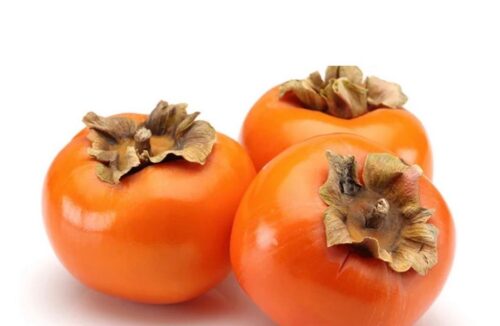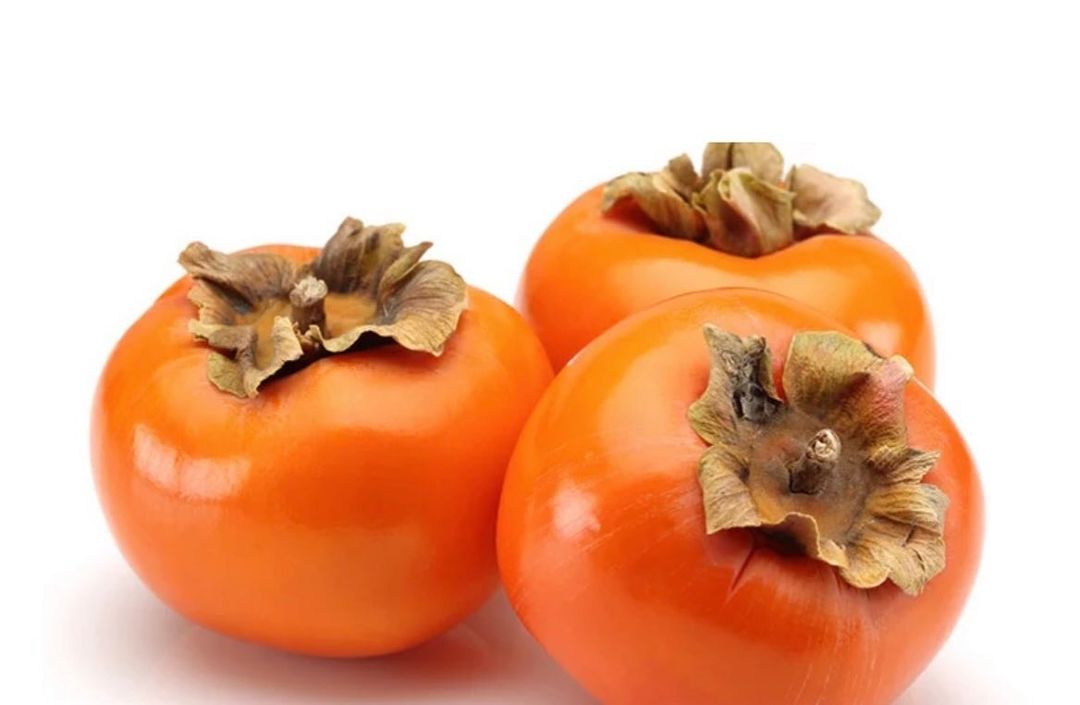Fuyu Persimmon is a delicious small fruit that is loved for its versatility and taste; read more facts about it in this guide.
The Fuyu Persimmon is an excellent choice if you want a fruit tree that is not only tasty but also adds beauty to your outdoor space.
Common Names: Chinese Date Plum ‘Fuyu,’ Kaki ‘Fuyu,’ Oriental Persimmon ‘Fuyu,’ Chinese Persimmon ‘Fuyu,’ Chinese Date Plum ‘Fuyu,’ Japanese Persimmon ‘Fuyu’
Botanical Name: Diospyros kaki ‘Fuyu’ (Japanese Persimmon)
Read: Roselle Plant Benefits and Uses
Fuyu Persimmon Information

The Fuyu Japanese Persimmon is a popular tree known for its delicious orange fruits and beautiful appearance. It is a deciduous tree with glossy green leaves that turn yellow, orange, or reddish-purple in the fall. The tree also produces small, unnoticed bell-shaped flowers in the spring, followed by large, flat, orange persimmon fruits the size of a medium tomato. The best part is that the tree doesn’t need pollination to produce fruit.
Fuyu tree looks amazing after the leaves fall, as the bright orange fruits remain on the branches, almost like Christmas ornaments. These fruits are seedless, sweet, and have a mild flavor. You can eat them when they’re firm, similar to apples, or let them ripen to a soft, mushy texture. The tree attracts wildlife and can be a great addition to your garden for both its fruit and its ornamental value.
This tree typically grows 20-30 feet tall and wide. It loves full sun and thrives in well-drained, fertile soil that’s kept moist. While it can tolerate drought once it’s established, it’s a good idea to protect it from cold winds and late spring frosts.
Fuyu Persimmon Facts
1. Family and Taste
Fuyu persimmons (Diospyros kaki) belong to the family Ebenaceae and are usually ready to eat in the middle to late part of the season. These fruits are a kind of non-astringent persimmon, which means they’re not very bitter, and you can eat the flesh right from the tree. Fuyu persimmons originally come from Asia and are often called Japanese, Chinese, Asian, or Oriental persimmons.
The fruit has a sweet and sugary flavor with hints of honey, cinnamon, pears, dates, and brown sugar.
2. Versatility
They are a very popular type of persimmon that is grown all around the world. People like them because they’re versatile, meaning you can eat them when they’re still hard and crunchy, or you can wait until they become soft. Unlike some other kinds of persimmons, like Hachiya, Fuyu persimmons are not bitter. This lack of bitterness makes them a top choice for grocery stores and distributors because people can enjoy them right away without having to wait for them to soften.
3. Size
Fuyu persimmons are small to medium-sized fruits, about 5 to 7 centimeters wide. They have a round, flat shape with smooth and shiny skin in shades of light orange to dark orange-red. When you buy them, make sure the green leafy top is more green than brown to ensure freshness.
4. Texture
Inside, the fruit has pale orange flesh that starts off dense, smooth, and firm. As it ripens, it becomes slightly softer and more tender. Fuyu persimmons don’t have a tough core so that you can eat the whole fruit. Most of the time, they are seedless, but occasionally, there might be one or two seeds. These persimmons are also low in tannins, which means they won’t leave your mouth feeling dry like some other persimmons can. You can eat this persimmon variety, either firm or soft, and you won’t experience any unpleasant taste.
5. Availability
These persimmons are available from the mid-fall over winter.
6. Can be Eaten Fresh and Cooked
You can use Fuyu persimmons in both fresh and cooked dishes, and they are a popular seasonal treat sold globally. It’s worth mentioning that “Fuyu” is often used as a general name for persimmons that are not astringent, meaning they won’t taste unpleasant. While these varieties look and taste similar, “Fuyu” can also refer to a specific type of non-astringent persimmon.
7. Storage
If you leave unwashed Fuyu persimmons in the fridge, they’ll stay fresh for 7 to 14 days. You can also freeze them for up to 3 months. When they’re frozen, you can eat them like custard. Just cut off the tops while they’re still cold to make a little bowl. Then, scoop out the frozen flesh with a spoon and enjoy it as a cool and tasty treat.
8. Given as a Gift
In China, persimmons are seen as lucky, and people often give them as gifts during weddings and the Lunar New Year. When given at weddings, it’s believed to bring the couple a blessing of everlasting love, and the gold color is thought to bring prosperity.
Read: Malabar Spinach Benefits
Benefits of Fuyu Persimmon
- Fuyu persimmons are a good source of vitamin C that boosts your immune system. It has fiber for a healthy digestive system, vitamin E to reduce inflammation, and potassium to keep your body fluids balanced.
- They also provide phosphorus for repairing tissues, vitamin K for faster wound healing, calcium for strong bones and teeth, and other nutrients like magnesium, iron, manganese, B vitamins, and beta-carotene. Beta-carotene turns into vitamin A in your body, supporting healthy organs and vision.
- In Traditional Chinese Medicine, persimmons are seen as having a cool and soothing effect on the body, helping to cool down heat.
- People believe they can improve your skin, and when made into tea, they may help with coughing or hiccups.
Fuyu Persimmon Uses
You can use them in various ways, like adding them to salads, grain bowls, salsa, or noodle dishes. They’re great sliced on cheese boards, wrapped in cured meats, or as a topping for toast, pizza, or yogurt. You can also blend them into smoothies or cook them into sweet or savory dishes like jams, jellies, sauces, pies, bread, pudding, cakes, and tarts. They go well with spices like cinnamon, nutmeg, cloves, and ginger, as well as with vanilla, brown sugar, cheeses, nuts, and herbs. You can even slice and dry them for a chewy snack.



